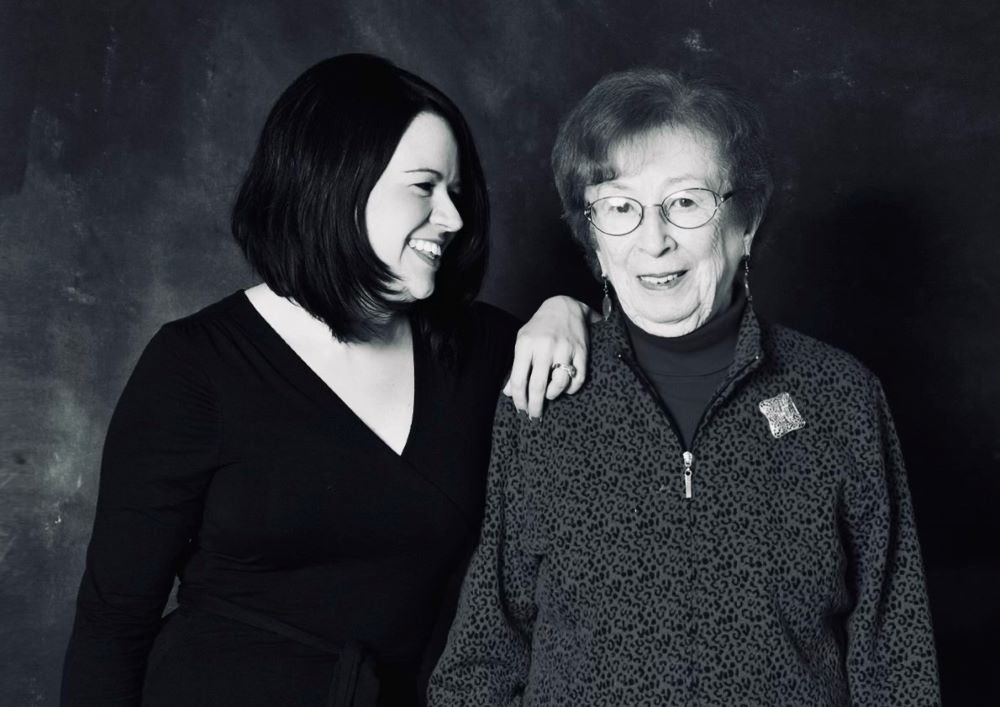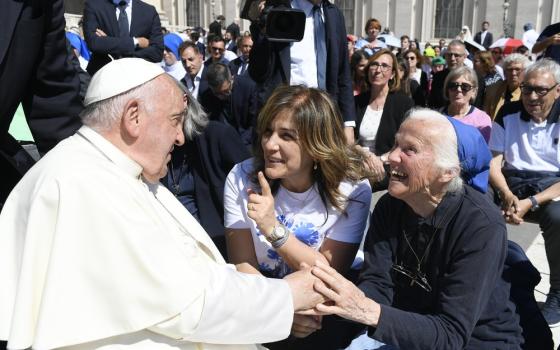
Erin Saiz Hanna (left) and Mercy Sr. Virginia Walsh (Courtesy of Erin Saiz Hanna)
Recently, I commemorated the third anniversary of the passing of my dear friend, Sister Virginia Walsh. Virginia left an indelible mark on my life not only as a revered mentor and college adviser but also as an extraordinary individual and woman religious. She was a luminous intellect, an ardent feminist, and had an unwavering commitment to antiracism and social justice. Most important, she was my dear friend who made me laugh out loud.
Virginia, a Sister of Mercy, exemplified Mercy's charism of sisterhood and friendship. Frances Warde, a close friend of Catherine McAuley, the foundress of the Sisters of Mercy, showed the power of intergenerational friendship. Frances forged a strong bond with Catherine despite being more than 30 years younger. Their touching letters capture the joys and sorrows of their extraordinary friendship.
Despite the substantial age difference of more than five decades, Virginia and I forged a connection that transcended conventional boundaries. A profound friendship flourished through our laughter-filled conversations about life, religion and politics. While the exact moment of our friendship's inception eludes me, I can confidently attest that Virginia was one of the cherished few with whom I shared the intimacy of personal phone calls. She called me a lot, and I guess I needed that.
Born in 1980, at the tail end of Generation X, my preferred mode of communication gravitates toward text-based exchanges. In contrast, Virginia belonged to the Silent Generation born in 1926 and upheld the tradition of voice conversations. Despite her technological savviness, she consistently favored the intimacy and connection conveyed through a traditional phone call. It was within the extended duration of these conversations that we experienced an intangible magic that defied explanation.
Virginia, a professor of sociology, embodied an unwavering dedication to the pursuit of social justice. Her profound contemplation of inequitable systems spurred an incessant quest to confront and dismantle them. In the 1990s, she pioneered a training program for police cadets in Providence, Rhode Island, focusing on bias and promoting anti-racism. This initiative garnered both local and national acclaim for its innovative approach. A distinctive aspect of the program was requiring officers to volunteer at local nonprofit organizations to help facilitate a more profound understanding of the communities they served. Whether engaged in her fieldwork or fostering meaningful friendships, Virginia consistently demanded introspection regarding the impact of one's presence on society's collective well-being. In our conversations, spanning a wide spectrum from work-related discussions to matters of the heart, she constantly challenged me to reflect upon the ripple effect of my actions on others.
Advertisement
Intergenerational friendships endow us with the invaluable opportunity to comprehend and empathize with individuals from divergent age groups. The exchange of diverse perspectives, wisdom, and life experiences enriches our lives, broadens our horizons and challenges the confines of our preconceived notions. Older friends, like Virginia, may assume the roles of mentors, offering invaluable guidance and wisdom. Virginia was a guidepost, offering sound advice to me on all major life decisions. Younger friends often infuse our lives with energy, innovation, and fresh perspectives. I know I kept Virginia moving — physically — taking her on trips to Washington, D.C., wineries, and thought-provoking lectures. Even in her 90s, she was keen to keep up with me. Our beautiful mutual exchange nurtured our personal development in unique and important ways.
I was blessed with her friendship for 20 years. In the months leading to Virginia's passing, I had the privilege to be by her side, tending to her needs, engaging in heartfelt conversations, and sharing moments of laughter and heartbreak until her last breath. It was a gift I do not take lightly, and though I still grieve the loss of our friendship, I remain profoundly grateful for the experiences we shared.
While Virginia was not my sole friend outside my peer group — I am so blessed to have many friends of differing ages — she continues to occupy a special place in my heart. As I grow older, I reflect not only on my relationships with those older than I but also on the connections I foster with my younger colleagues and friends. In the tapestry of sisterhood and intergenerational friendships, I find the embodiment of Catholic teaching — an unwavering commitment to the well-being of others and the fostering of spiritual growth through shared experiences and friendship.
For those acquainted with Earth Mama's women’s rights song, "Standing on the Shoulders," resonances arise, intertwining with the familiar narrative of intergenerational sisterhood. This narrative, beyond merely paying homage to the accomplishments of each successive generation, encapsulates the profound and enduring bonds of intergenerational friendship that unite them.
As Mama Earth wrote:
I am standing on the shoulders of the ones who came before me.
I am honored by their passion for our liberty.
I will stand a little taller,
I will work a little longer.
And my shoulders will be there to hold the ones who follow me.





